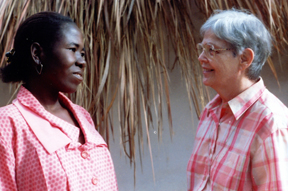The plight of the Tiv people
Living and working among the Tiv people in Nigeria for 30 years, Our Lady’s Missionaries are now witnessing the horror and reality of ethnic cleansing
By Sr. Suzanne Marshall, O.L.M.
Summer 2002
Return to Table of Contents
Print Article
They ran for their lives, hiding in the bush for days without food or water, many wounded. Adults carried children or old parents on their backs, some crawled for miles because if they stood the militias would shoot them. Their stories are horrific.
 Sr. Suzanne Marshall with Judith, a pastoral team worker. Sr. Suzanne trains and supervises staff and coordinates the pastoral care program for people with HIV and AIDS at St. Monica’s Hospital in Adikpo, Nigeria.
Sr. Suzanne Marshall with Judith, a pastoral team worker. Sr. Suzanne trains and supervises staff and coordinates the pastoral care program for people with HIV and AIDS at St. Monica’s Hospital in Adikpo, Nigeria.
In order to reach safety, many had to cross the deep river the people call Red, holding their small children high above their heads. They crossed at night, fearing that they would be shot in daylight. Weary and weakened from the long trek, some lost their children in the murky waters.
Mbabeen, a paraplegic and Sr. Rosemarie Donovan’s friend for many years, lived with her son in a small village in Taraba State. The night before the attack her son heard a rumour that there would be trouble the following day. He managed to get a pickup truck to carry his mother to safety deep in the bush. Others were not so fortunate. Sarah and her children ran for the bush when the shooting started. A snake bit her as she crouched in the bush and her children watched her die before they began the long walk to safety.
This is a complicated conflict revolving around politics and land. Its roots are in the distant past. The Tiv people, like all other Nigerians, are indigenous to many states in addition to Benue. A large population of Tivs has lived for generations in Taraba, Nassarawa and Plateau States while some are found in Cross River and the Republic of Cameroon.
They arrived in Taraba State between 1750 and 1800. In Nasarawa State people of Tiv extraction have peacefully co-existed with other tribes since the 17th century. Following the arrival of the British, all ethnic minorities south of the Benue River, including Idoma, Igala, Tiv, Jukun, Alaga, and others, were all united to form Munshi Province (Munshi being a term widely recognized as a nickname for the Tiv). The province covered all the areas now under Taraba, Nasarawa, Benue and parts of Plateau States.
Because of their large numbers the Tivs have had, in the past, effective representation in national, state and local elections. Under democratic rule they began to re-organize so as to enhance their economic base and tap into government subsidies to build up their infrastructure.
To stop the Tivs from expanding, local officials seized the land that the Tivs had held for centuries and gave it to others. Complaints made by the Tiv people were never addressed. The crisis in Nasarawa and Taraba States was aimed at curtailing the alleged fear of Tiv domination based on their population.
The Tivs seem to be a forgotten people...
They look to their leaders and the government to redress this terrible injustice and in the interim they wait and hope and pray.
Although there were tribal clashes throughout 2001, the fighting broke out in earnest in June of that year, following the assassination of a local chief in Nasarawa State. Wanton destruction of lives and property left 1,000 people dead and over 250,000 driven from their ancestral lands to seek shelter with relatives in Benue or to resettle in refugee camps set up within the border of Benue State.
The fighting quickly spread to Taraba State forcing hundreds of thousands of Tiv people into already overcrowded Benue. In Vandeikya local municipality we have five refugee camps and in Christ the King parish in Vandeikya town over 8,000 refugee families were registered in the first two months.
Vandeikya town is swollen with people. Families, already finding it difficult to provide food for their own, are facing the addition of 10 or 15 relatives seeking shelter, food and medical care. Youth roam the main street with nothing to do. There is no land to farm. There is nothing to sell or trade. Some people tried to return to their farms in Taraba State to either collect the food they had already stored or to harvest crops. Most never returned. They were caught and killed.
The Tivs seem to be a forgotten people. While they were in camps near the border of Benue they were receiving food, clothing and some medical care from church and relief agencies, as well as some government sources.
Now that many more Tivs are in the rural towns and villages such as Vandeikya, very little assistance has been provided. They come to our compound and to the parish house asking for food and medical care. We try to help in whatever way we can but the numbers are great and our resources small.
The term “ethnic cleansing” has become so familiar as to be commonplace. But when you see it happening, when you feel the terror and anger of people uprooted from the land they have called home for generations, when they come to your door hungry and hopeless, wounded and confused, the reality is quite different. The people look to their leaders and the government to redress this terrible injustice and in the interim they wait and hope and pray.
Return to Table of Contents
Print Article